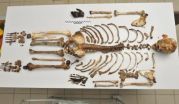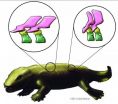(Press-News.org) PITTSBURGH/NEW YORK—January 14, 2013— Users of Facebook and other social networks should beware of allowing their self-esteem—boosted by "likes" or positive comments from close friends—to influence their behavior: It could reduce their self-control both on and offline, according to an academic paper by researchers at the University of Pittsburgh and Columbia Business School that has recently been published online in the Journal of Consumer Research.
Titled "Are Close Friends the Enemy? Online Social Networks, Self-Esteem, and Self-Control," the research paper demonstrates that users who are focused on close friends tend to experience an increase in self-esteem while browsing their social networks; afterwards, these users display less self-control. Greater social network use among this category of users with strong ties to their friends is also associated with individuals having higher body-mass indexes and higher levels of credit-card debt, according to the paper.
"To our knowledge, this is the first research to show that using online social networks can affect self-control," said coauthor Andrew T. Stephen, assistant professor of business administration and Katz Fellow in Marketing in the University of Pittsburgh Joseph M. Katz Graduate School of Business and College of Business Administration. "We have demonstrated that using today's most popular social network, Facebook, may have a detrimental affect on people's self-control."
Stephen coauthored the research with Keith Wilcox, assistant professor of marketing at Columbia Business School. The paper includes the results of five separate studies conducted with a total of more than 1,000 U.S. Facebook users.
In the researchers' initial study, participants completed surveys about how closely they're connected to friends on Facebook. Then they were split into two groups: one group that wrote about the experience of browsing Facebook and another group that actually browsed Facebook. Both groups then completed a self-esteem survey. Regardless of whether the participants wrote about Facebook browsing or actually browsed the site, the participants with weak ties to Facebook friends did not experience an increase in self-esteem, but those with strong ties to friends had an enhanced sense of self-esteem.
Stephen and Wilcox's second study evaluated why Facebook users with strong ties to friends were more likely to experience an increase in self-esteem. Participants were prompted to browse Facebook for five minutes. Some were told to pay attention to the status updates and other information people were sharing with them. Others were directed to concentrate on information they were sharing. The researchers concluded that browsing Facebook only increased participants' self-esteem when they were focused on the information they were presenting to others.
"We find that people experience greater self-esteem when they focus on the image they are presenting to strong ties in their social networks," said Wilcox. "This suggests that even though people are sharing the same positive information with strong ties and weak ties on social networks, they feel better about themselves when the information is received by strong ties than by weak ties."
Cookies, granola bars, and word puzzles were part of the methodology of the third and fourth studies, which established the link between self-esteem and self-control. Participants in the third study were instructed either to check Facebook or read news articles on CNN.com, then choose between eating a granola bar or a chocolate-chip cookie. Those who had browsed Facebook were more likely to choose the cookie. Participants in the fourth study were given anagram word puzzles to solve after either checking Facebook or reading TMZ.com, a celebrity news and gossip website. The Facebook browsers were more likely to give up on the puzzles.
The fifth investigation, an online field study, examined the relationship between online social network use and offline behaviors associated with poor self-control. Participants completed a survey asking about their height and weight, the number of credit cards they own and the amount of debt on them, and how many friends they have offline, among other questions. "The results suggest that greater social network use is associated with a higher body-mass index, increased binge eating, a lower credit score, and higher levels of credit-card debt for individuals with strong ties to their social network," the researchers wrote.
Stephen and Wilcox say the five studies have implications for policy makers because self-control is an important mechanism for maintaining social order and well-being. "It would be worthwhile for researchers and policy makers to further explore social network use in order to better understand which consumers may be particularly vulnerable to suffering negative psychological or social consequences," the authors wrote.
The paper, published online in November, is scheduled for publication in the June 2013 print edition of the Journal of Consumer Research. Stephen and Wilcox are contemplating a future inquiry into social networks and behavior that would address the long-term effects of Facebook on users. "It would be interesting," they wrote, "to explore the persistence of the effect of browsing Facebook over time."
###
About Columbia Business School
Led by Dean R. Glenn Hubbard, the Russell L. Carson Professor of Finance and Economics, Columbia Business School is at the forefront of management education for a rapidly changing world. The School's cutting-edge curriculum bridges academic theory and practice, equipping students with an entrepreneurial mindset to recognize and capture opportunity in a competitive business environment. Beyond academic rigor and teaching excellence, the School offers programs that are designed to give students practical experience making decisions in real-world environments. The School offers MBA and Executive MBA (EMBA) degrees, as well as non-degree Executive Education programs. For more information, visit www.gsb.columbia.edu.
About the University of Pittsburgh's Business Programs
The Joseph M. Katz Graduate School of Business delivers a high quality business education through its MBA, Executive MBA, PhD, and Master of Accounting programs that are continually ranked by independent publications as being among the world's best. The College of Business Administration awards the Bachelor of Science in Business Administration degree with majors in accounting, finance, marketing, and general management. Led by world-renowned faculty, the graduate school and undergraduate college offer curricula that incorporate groundbreaking research, the entrepreneurial spirit, and an emphasis on experience-based learning. Alumni live in more than 90 countries. Visit www.business.pitt.edu for more information.
Social networks may inflate self-esteem, reduce self-control
Pitt and Columbia researchers publish evidence on Facebook behavior and how it relates to users' self-control, body-mass indexes, and credit-card debt
2013-01-14
ELSE PRESS RELEASES FROM THIS DATE:
Fox Chase researchers discover novel role of the NEDD9 gene in early stages of breast cancer
2013-01-14
PHILADELPHIA, PA (January 14, 2013)—Breast cancer is the second leading cause of cancer deaths among women in the United States. Many of these deaths occur when there is an initial diagnosis of invasive or metastatic disease. A protein called NEDD9—which regulates cell migration, division and survival—has been linked to tumor invasion and metastasis in a variety of cancers. Researchers at Fox Chase Cancer Center have now shown that NEDD9 plays a surprising role in the early stages of breast tumor development by controlling the growth of progenitor cells that give rise to ...
Pill-sized device provides rapid, detailed imaging of esophageal lining
2013-01-14
Physicians may soon have a new way to screen patients for Barrett's esophagus, a precancerous condition usually caused by chronic exposure to stomach acid. Researchers at the Wellman Center for Photomedicine at Massachusetts General Hospital (MGH) have developed an imaging system enclosed in a capsule about the size of a multivitamin pill that creates detailed, microscopic images of the esophageal wall. The system has several advantages over traditional endoscopy.
"This system gives us a convenient way to screen for Barrett's that doesn't require patient sedation, a ...
The secrets of a tadpole's tail and the implications for human healing
2013-01-14
Scientists at The University of Manchester have made a surprising finding after studying how tadpoles re-grow their tails which could have big implications for research into human healing and regeneration.
It is generally appreciated that frogs and salamanders have remarkable regenerative capacities, in contrast to mammals, including humans. For example, if a tadpole loses its tail a new one will regenerate within a week. For several years Professor Enrique Amaya and his team at The Healing Foundation Centre in the Faculty of Life Sciences have been trying to better understand ...
Cancer suppressor gene links metabolism with cellular aging
2013-01-14
PHILADELPHIA - It is perhaps impossible to overstate the importance of the tumor suppressor gene p53. It is the single most frequently mutated gene in human tumors. p53 keeps pre-cancerous cells in check by causing cells, among other things, to become senescent – aging at the cellular level. Loss of p53 causes cells to ignore the cellular signals that would normally make mutant or damaged cells die or stop growing.
In short, the p53 pathway is an obvious and attractive target for drug developers. But that strategy has so far proven difficult, as most p53 regulatory proteins ...
The genome of diamondback moth provides new clues for sustainable pest management
2013-01-14
January 13, 2013, Fujian and Shenzhen, China- An international research consortium, led by Fujian Agriculture, Forestry University (FAFU) and BGI, has completed the first genome sequence of the diamondback moth (DBM), the most destructive pest of brassica crops. This work provides wider insights into insect adaptation to host plant and opens new ways for more sustainable pest management. The latest study was published online today in Nature Genetics.
The diamondback moth (Plutella xylostella) preferentially feeds on economically important food crops such as rapeseed, cauliflower ...
What did our ancestors look like?
2013-01-14
A new method of establishing hair and eye colour from modern forensic samples can also be used to identify details from ancient human remains, finds a new study published in BioMed Central's open access journal Investigative Genetics. The HIrisPlex DNA analysis system was able to reconstruct hair and eye colour from teeth up to 800 years old, including the Polish General Wladyslaw Sikorski (1881 to 1943) confirming his blue eyes and blond hair.
A team of researchers from Poland and the Netherlands, who recently developed the HIrisPlex system for forensic analysis, have ...
New study reveals gas that triggers ozone destruction
2013-01-14
Scientists at the Universities of York and Leeds have made a significant discovery about the cause of the destruction of ozone over oceans.
They have established that the majority of ozone-depleting iodine oxide observed over the remote ocean comes from a previously unknown marine source.
The research team found that the principal source of iodine oxide can be explained by emissions of hypoiodous acid (HOI) – a gas not yet considered as being released from the ocean – along with a contribution from molecular iodine (I2).
Since the 1970s when methyl iodide (CH3I) was ...
Graphene plasmonics beats the drug cheats
2013-01-14
Writing in Nature Materials, the scientists, working with colleagues from Aix-Marseille University, have created a device which potentially can see one molecule though a simple optical system and can analyse its components within minutes. This uses plasmonics – the study of vibrations of electrons in different materials.
The breakthrough could allow for rapid and more accurate drug testing for professional athletes as it could detect the presence of even trace amounts of a substance.
It could also be used at airports or other high-security locations to prevent would-be ...
Scientists reassemble the backbone of life with a particle acceleratorynchrotron X-rays
2013-01-14
This press release is available in French and German.
Jointly issued with STFC and the Royal Veterinary College London.
Scientists have been able to reconstruct, for the first time, the intricate three-dimensional structure of the backbone of early tetrapods, the earliest four-legged animals. High-energy X-rays and a new data extraction protocol allowed the researchers to reconstruct the backbones of the 360 million year old fossils in exceptional detail and shed new light on how the first vertebrates moved from water onto land. The results are published 13 January ...
Foot soldiers of the immune system
2013-01-14
Researchers at McGill University and the Research Center for Molecular Medicine (CeMM) of the Austrian Academy of Sciences have discovered the molecular blueprint behind the IFIT protein. This key protein enables the human immune system to detect viruses and prevent infection by acting as foot soldiers guarding the body against infection. They recognize foreign viral ribonucleic acid (RNA) produced by the virus and act as defender molecules by potentially latching onto the genome of the virus and preventing it from making copies of itself, blocking infection. The findings ...
LAST 30 PRESS RELEASES:
Globe-trotting ancient ‘sea-salamander’ fossils rediscovered from Australia’s dawn of the Age of Dinosaurs
Roadmap for Europe’s biodiversity monitoring system
Novel camel antimicrobial peptides show promise against drug-resistant bacteria
Scientists discover why we know when to stop scratching an itch
A hidden reason inner ear cells die – and what it means for preventing hearing loss
Researchers discover how tuberculosis bacteria use a “stealth” mechanism to evade the immune system
New microscopy technique lets scientists see cells in unprecedented detail and color
Sometimes less is more: Scientists rethink how to pack medicine into tiny delivery capsules
Scientists build low-cost microscope to study living cells in zero gravity
The Biophysical Journal names Denis V. Titov the 2025 Paper of the Year-Early Career Investigator awardee
Scientists show how your body senses cold—and why menthol feels cool
Scientists deliver new molecule for getting DNA into cells
Study reveals insights about brain regions linked to OCD, informing potential treatments
Does ocean saltiness influence El Niño?
2026 Young Investigators: ONR celebrates new talent tackling warfighter challenges
Genetics help explain who gets the ‘telltale tingle’ from music, art and literature
Many Americans misunderstand medical aid in dying laws
Researchers publish landmark infectious disease study in ‘Science’
New NSF award supports innovative role-playing game approach to strengthening research security in academia
Kumar named to ACMA Emerging Leaders Program for 2026
AI language models could transform aquatic environmental risk assessment
New isotope tools reveal hidden pathways reshaping the global nitrogen cycle
Study reveals how antibiotic structure controls removal from water using biochar
Why chronic pain lasts longer in women: Immune cells offer clues
Toxic exposure creates epigenetic disease risk over 20 generations
More time spent on social media linked to steroid use intentions among boys and men
New study suggests a “kick it while it’s down” approach to cancer treatment could improve cure rates
Milken Institute, Ann Theodore Foundation launch new grant to support clinical trial for potential sarcoidosis treatment
New strategies boost effectiveness of CAR-NK therapy against cancer
Study: Adolescent cannabis use linked to doubling risk of psychotic and bipolar disorders
[Press-News.org] Social networks may inflate self-esteem, reduce self-controlPitt and Columbia researchers publish evidence on Facebook behavior and how it relates to users' self-control, body-mass indexes, and credit-card debt


